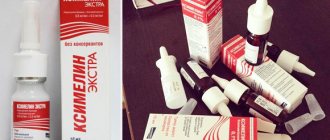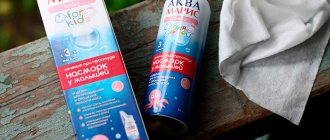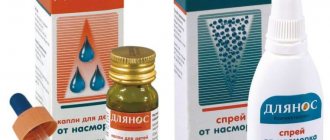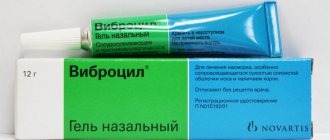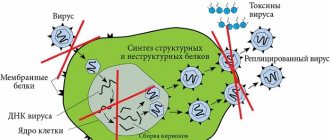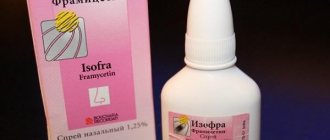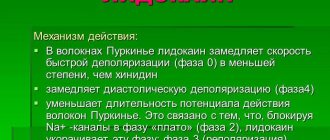What Rinostop contains
The main active component of the drug is xylometazoline hydrochloride. This substance belongs to alpha-adrenergic agonists; when applied topically, it causes a reflex vasoconstriction.
Rinostop is produced in the form of:
- nasal spray: in bottles with a dispenser spray with a capacity of 10–30 ml, with a concentration of 0.1 and 0.05% of the active substance;
- nasal drops: similar volume and concentration in bottles with a drip dispenser.
Among the auxiliary components of the product: distilled water and stabilizing additives.
Composition per 1 ml
Active substance: xylometazoline hydrochloride – 0.50 mg or 1.00 mg; Excipients: disodium edetate (Trilon B) – 0.50 mg, sodium chloride – 9.00 mg, benzalkonium chloride – 0.15 mg, potassium dihydrogen phosphate – 3.63 mg, sodium hydrogen phosphate dodecahydrate – 7.13 mg, purified water – up to 1 ml.
Description: transparent, colorless or slightly colored liquid.
Pharmacotherapeutic group: anticongestive agent – alpha-adrenergic agonist.
ATX code : R01AA07
What does Rinostop help with?
Xylometazoline, getting on the mucous membrane, narrows capillary vessels, stimulates the outflow of fluid, eliminates swelling, freeing the nasal passages and relieving congestion. This is a symptomatic drug, its compounds act locally, a small amount of the drug is absorbed into the bloodstream, which is unable to cause systemic effects for the body.
The mechanism of operation of Rinostop is based on the reaction of adrenoline receptors. The narrowing of the nasal capillaries and the reduction of swelling as a result of its use helps prevent further complicated course of the respiratory disease, prevent inflammation of the middle ear or the development of acute sinusitis.
The effect occurs 2–4 minutes after applying the solution to the mucous membranes and lasts up to 6–8 hours.
Correct use of the medicine does not lead to disruption of the functions of the ciliated epithelium and the synthesis of protective mucous secretion. The drug does not affect the general course of the disease and infectious pathogens. It reduces symptoms and restores physical comfort by restoring nasal breathing.
Pharmacological effect
Xylometazoline belongs to alpha-adrenergic agonists - substances that stimulate the activity of specific receptors in the vascular walls that are sensitive to adrenaline and nonadrenaline. The result of its action is a rapid narrowing of the lumen and a decrease in capillary permeability upon contact with mucous membranes. Thanks to this, swelling at the site of inflammation is significantly reduced, the intensity of mucous discharge during rhinitis is reduced, and it becomes possible to breathe normally.
The vasoconstrictor effect of xylometazoline is not accompanied by disturbances in the condition of the mucosa or changes in its functions. The ciliated epithelium, which traps particles of dust and other contaminants penetrating into the nasal cavity, does not reduce activity during the use of Rinostop.
The use of the drug also does not have a systemic effect. Xylometazoline is absorbed into the general bloodstream in small quantities, narrowing only the capillaries of the mucous membrane. Rinostop does not affect the duration of diseases and the intensity of their course. Its task is to eliminate negative symptoms of congestion and restore normal well-being during illness.
The effect of using the solution occurs within 2–5 minutes. after applying it to the mucous membranes: the swelling resolves, the lumen of the nasal passages increases, opening up access to air. The effect of the drug lasts up to 5–7 hours.
When should you use Rinostop?
Indications for using the nasal solution include:
- acute rhinitis with nasal congestion;
- vasomotor, allergic and other types of runny nose, accompanied by swelling of the mucous membranes and impaired nasal breathing;
- for sinusitis, sinusitis and other sinusitis with congestion and swelling of the nasal sinuses;
- with inflammation and swelling of the auditory tube;
- in preparation for diagnostic procedures before treatment with an otolaryngologist.
Rinostop is not a long-acting drug. It must be used once or in short courses over several days. Otherwise, the risk of side effects and complications increases.
Overdose
In case of an overdose or accidental ingestion of the drug, the following symptoms may develop: nausea, vomiting, cyanosis, fever, tachycardia, arrhythmia, increased blood pressure, shortness of breath, mental disorders, depression of the central nervous system (drowsiness, decreased body temperature, bradycardia, decreased blood pressure, respiratory arrest and coma).
Treatment: symptomatic: in case of accidental ingestion - gastric lavage, taking activated charcoal.
When is Rinostop contraindicated?
It is necessary to refuse the use of the drug:
- for chronic glaucoma;
- with atrophy of the nasal mucosa;
- for hypertension and hypertension;
- for heart rhythm disturbances: bradycardia, tachycardia;
- individual hypersensitivity to the components of the drug;
- after brain surgery;
- cerebrovascular accidents;
- during treatment with tricyclic antidepressants, MAO inhibitors.
Rinostop requires careful use in diabetes mellitus, thyroid diseases, high cholesterol levels, atherosclerotic changes in blood vessels, and prostate hyperplasia.
Side effects
During the period of use of the solution, due to vasoconstriction, the natural hydration of the mucous membrane decreases. Minor itching and dryness are likely to occur, especially in cold weather. After stopping the course, the unpleasant sensations disappear without a trace.
In case of overdose of Rinostop or long-term use - more than 1 week, the following are possible:
- increased dryness;
- severe itching, burning;
- irritation and redness of the mucous membrane;
- increased discharge and swelling.
Occasionally, people prone to depression experience mood depression while using the drug.
How to use Rinostop for children
The drug in a reduced dosage of 0.05% is approved for treatment from 2 years of age. For children under 6 years old, it is enough to apply the spray or instill the product 2-3 times a day, 1 drop or one press of the dispenser into each nostril, after blowing their nose and clearing the nose of mucus.
It is more optimal to use a spray, since it does not require tilting your head during application, evenly irrigates the mucous membranes, and creates a lower risk of overdose.
The drug at a concentration of 0.1% can be used from 6 years of age:
- 6–10 year old children: no more than 2 times a day, 1 drop or spray into both nostrils;
- from 10 years: up to 3 times a day, 1-2 doses in each nostril.
One-time or 2-3-day use of a vasoconstrictor is preferable.
Rinostop aqua baby nasal spray for children from birth 125ml
pharmachologic effect
Rinostop is a vasoconstrictor for local use in ENT practice. Alpha adrenergic agonist.
Composition and release form Rinostop aqua baby nasal spray for children from birth 125ml
Spray - 1 ml.:
Active substance: xylometazoline.
125 ml of the drug in an aluminum pressure cylinder with an internal antiseptic coating. The bottle with instructions for use is placed in a cardboard box.
Description of the dosage form
Nasal spray in the form of a colorless, transparent, odorless solution.
Directions for use and doses
For children aged from birth to 6 years (0.05% spray) one spray from a spray bottle into each nasal passage 1 or 2 times a day; should not be used more than 3 times a day.
Do not use the drug without a break for more than 3-5 days.
Pharmacokinetics
When applied topically, it is practically not absorbed; plasma concentrations are so small that they cannot be determined by modern analytical methods.
Indications for use Rinostop aqua baby nasal spray for children from birth 125ml
Prevention and complex treatment of acute and chronic inflammatory diseases of the nasal cavity, paranasal sinuses and nasopharynx (infectious, allergic, atrophic):
- Acute and chronic rhinitis (runny nose);
- acute and chronic sinusitis (including sinusitis);
- acute and chronic adenoiditis;
- allergic and vasomotor rhinitis;
- subatrophic rhinitis (dry mucous membrane).
Complex treatment of acute respiratory diseases, including acute respiratory viral infections and influenza.
Daily hygiene of the nasal cavity and nasopharynx (including in unfavorable environmental conditions).
Prevention of acute respiratory diseases, including ARVI and influenza during epidemics.
Condition after surgical interventions in the nasal cavity and paranasal sinuses.
Preparation of the nasal mucosa for the use of drugs.
Contraindications
Angle-closure glaucoma, atrophic rhinitis, arterial hypertension, tachycardia, severe atherosclerosis, hyperthyroidism, surgical interventions on the meninges (history), hypersensitivity to xylometazoline.
Effect on the body
Thoroughly rinses all parts of the nasal cavity and nasopharynx, actively cleaning them from bacteria, viruses, allergens, crusts, mucus, and dust particles.
Has an anti-inflammatory and moisturizing effect, relieves irritation.
Reduces swelling of the mucous membrane of the nasal cavity and nasopharynx, helps restore nasal breathing.
Accelerates the processes of regeneration of the mucous membrane of the nasal cavity and nasopharynx, reduces the risk of complications after operations in the nasal cavity and paranasal sinuses.
Stimulates the protective function of the ciliated epithelium, helps maintain the normal physiological state of the mucous membrane of the nasal cavity and nasopharynx.
Increases the therapeutic effectiveness of drugs applied to the nasal mucosa (vasoconstrictors, antibiotics, antiallergic drugs, etc.), reduces their consumption and side effects.
Increases local immunity.
Application of Rinostop aqua baby nasal spray for children from birth 125ml during pregnancy and breastfeeding
During pregnancy and lactation, Rinostop should be used only after a thorough assessment of the risk-benefit ratio for the mother and fetus; recommended doses should not be exceeded.
special instructions
The nozzle is equipped with a special restrictive ring, which prevents injury to the child’s nasal mucosa during use.
Pressurized container: protect from direct sunlight and temperatures above 50°C. Do not pierce or burn, even after use.
Side effects Rinostop aqua baby nasal spray for children from birth 125ml
With frequent and/or prolonged use: irritation of the mucous membrane, burning, tingling, sneezing, dry nasal mucosa, hypersecretion.
Rarely: swelling of the nasal mucosa (more often with long-term use), palpitations, heart rhythm disturbances, increased blood pressure, headache, vomiting, sleep disorders, visual disturbances.
With long-term use in high doses: depressive state.
Carefully
With increased intraocular pressure, chronic heart failure, arterial hypertension, angina pectoris; arrhythmias; chronic renal failure; in patients with prostatic hyperplasia with clinical symptoms (urinary retention); severe atherosclerosis; with hyperthyroidism; diabetes mellitus; pheochromocytoma; tachycardia; therapy with monoamine oxidase inhibitors (MAO) (including for up to 14 days after their discontinuation) and tricyclic antidepressants, as well as other drugs that increase blood pressure; porphyria; pregnancy, during breastfeeding.
Contraindications
Like other xylometazoline-based products, Rinostop is prohibited from use:
- when treating children under 2 years of age;
- for severe forms of hypertension;
- glaucoma;
- increased intracranial pressure;
- consequences of traumatic brain injuries;
- some forms of cardiac arrhythmia;
- with individual high sensitivity to any of the components.
Pregnant women are also prohibited from using Rinostop due to the high risk of developing gestosis.
The remedy for nasal congestion requires special care in case of existing chronic heart diseases, atherosclerosis and other vascular pathologies, including complications of diabetes mellitus and hyperthyroidism. In such cases, drops and spray should be used as rarely as possible, only in case of significant problems with breathing. During their use, it is important to monitor vital signs.
